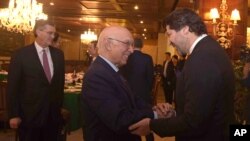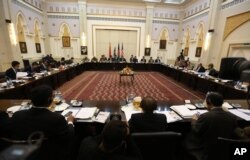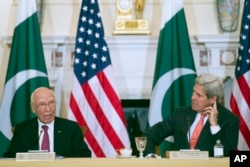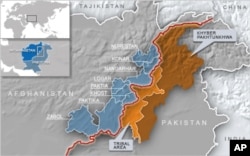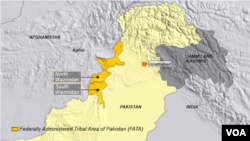Hopes for resumption of Afghan peace talks ahead of the so-called Taliban spring offensive seem to have diminished, prompting Afghanistan to increasingly blame neighboring Pakistan for the lack of progress.
Afghanistan and Pakistan have been trying to arrange direct peace talks between the Kabul government and the Taliban to seek a settlement to the Afghan war.
The United States and China have supervised the effort but the so-called Quadrilateral Coordination Group (QCG) has failed to initiate the peace process. The group is likely to meet again later this month.
The Taliban’s refusal to engage with the Kabul government in any talks is blamed for the setback. It has also fueled fears of a bloody upcoming Afghan fighting season.
Afghanistan’s ambassador to Pakistan, Hazrat Khalil Zakhilwal, believes tensions the two countries are to be blamed for preventing progress in the peace process.
Addressing a seminar in Islamabad on Thursday with Pakistani foreign policy adviser Sartaj Aziz, the Afghan diplomat insisted it is widely believed back in his country that Taliban commanders are using Pakistan for insurgent activities with the knowledge and help of the country’s security institutions.
“I need to be very frank and undiplomatic. I think the main hurdle to peace, the biggest obstacle to peace is Afghan-Pakistan relationship. It is the environment of mistrust it is the environment that we suspect each other, it is the environment of practical disengagement,” he said.
Mistrust
Afghan officials insist that Pakistan through the QCG committed itself to put pressure on Taliban leaders to come to the negotiating table and to take military action against those on its soil who refuse to end violence.
Zakhilwal stopped short of questioning successes Pakistani security forces have made in their campaign to uproot militant bases in volatile tribal areas border near the Afghan border.
“A consequence of your army’s operation in the border area, in North Waziristan, in South Waziristan and others, has not been a total elimination of those individuals or arrest of those individuals," he said. "A lot of those have been pushed, not intentionally [and] certainly we must be clear about this, but they have taken refuge on the other side.”
Pakistan advisor Aziz, however, insisted that member nations in the four-way group have agreed to collectively decide how to deal with Taliban groups who refuse to join the peace process.
“While Pakistan will continue to play a positive role in the process it is important to recognize that we cannot dictate terms to either the Afghan government or the Afghan Taliban. It is they who have to come to terms and reach a basis on which negotiations can be successful,” he said.
Pakistan military blamed
Afghan officials in recent days have again started accusing the Pakistan military and its spy agency of being behind the Taliban’s resurgence in their country. Aziz rejected them as the work of “detractors and spoilers” to derail the Afghan peace process.
“We are concerned of course at the continued negative propaganda in Afghanistan about Pakistan despite our concreted efforts for peace and stability in Afghanistan,” he said.
The Pakistani advisor also agreed that the key issue is restoring the trust between the two countries, saying Islamabad looks forward to strengthening cooperation with Kabul to address the challenge.
Aziz retreated that there is a pressing need to implement an “effective framework for border management” to check cross-border movements of terrorists and other criminal elements threatening security and stability of their two nations.




